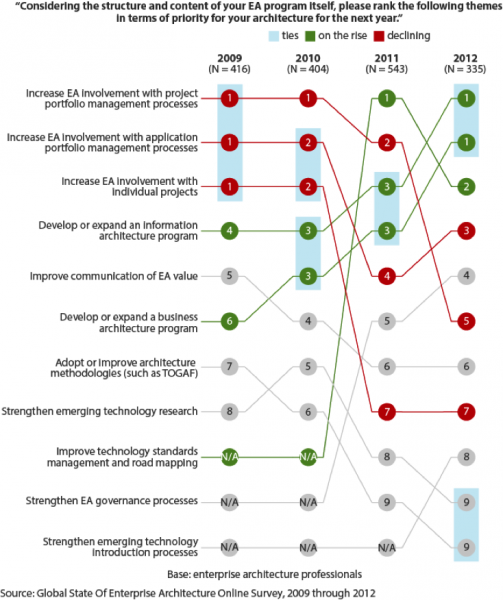Forrester’s Information Strategy And Architecture Survey Will Establish Current Management Practices In A Rapidly Changing World
It's becoming pretty clear that the ability to analyze data is becoming one of the most important technology-based capabilities an enterprise can have. There's a lot of hype around about big data, and it's actually well-founded hype — if that's not a contradiction (perhaps I should call it well-founded fanfare). In any event, our world is changing as organizations gain the ability to process formerly unheard-of amounts of data with formerly unheard-of speed. New, improved information processing capabilities are significantly changing science, where scientists in labs look for patterns in data rather than dream up hypothoses and run tests to prove them right or wrong. And, in similar ways, it's changing how businesses make decisions. I've been looking for evidence that enterprises are moving on improving their information management capabilities since we started doing our "State of EA" surveys in 2009, and the 2012 data finally shows that developing or expanding information architecture is finally EA's #1 priority (well, OK, it's tied for first place with developing or expanding business architecture).
Information Architecture Is Finally A #1 EA Priority

Other things are changing, too. The whole idea of pursuing a "single source of truth" as a primary aim of information management is becoming just one of several ways of getting value out of data. In all this change, one area I haven't seen a lot of information on is the organizational change that enterprises are pursuing to ensure they're as focused as possible on delivering information management capabilities. We're seeing some new organizational roles get attention — Data Scientists and Chief Data Officers being the most common we see popping up — but what's happening in general with the currently scattered information management specialists? Are they consolidating into a single unit? Are we just going to see big data centers of excellence grafted on to current organizations? Is there a widespread change in who-does-what with respect to data that enterprises should be aware of?
Forrester's Information Strategy And Architecture Survey aims to find all this out. It will establish the current state of how organizations approach information strategies, information management, and information architecture, as well as whether enterprises are planning any changes to their approach. The information from the survey will show up in a report for Forrester clients around the end of this quarter, but non-clients can get the data if they contribute to the survey.
If you're knowledgeable about how your organization approaches information management and information strategy, take our survey and you'll get complimentary survey data and a free webinar discussing the data. We'd love to hear from you!
